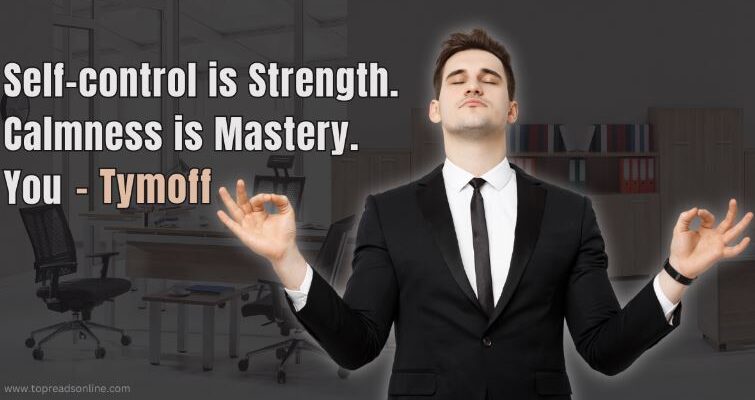Understanding the Essence of the Quote
The phrase “Self-control is strength. Calmness is mastery. You – Tymoff” isn’t just a catchy statement. It delves deep into the essence of human emotions, encapsulating the significance of emotional intelligence, self-regulation, and self-awareness. These are more than just traits; they’re the foundational elements of a balanced, successful, and enriched life.
The Power of Self-Control
As highlighted by Saeed Ahmadi, self-control is not just a virtue; it’s a cornerstone for personal development. If you find yourself constantly reacting rather than responding, impulsively choosing immediate pleasure over long-term benefits, it might indicate a lack of self-control. But once you embrace and nurture this trait, you resist impulsive decisions and bolster your ability to rebound from adversities. In essence, you become the captain of your ship, steering your life towards principles and dreams instead of fleeting desires.
Embracing Calmness: A Game Changer
While self-control lays the foundation, calmness elevates one’s capabilities. Maintaining a calm demeanor can often be challenging in a world filled with noise, chaos, and countless distractions. However, by mastering calmness, you achieve clarity of thought, which aids decision-making, improves interpersonal relationships, and promotes a genuine sense of well-being.
Intertwining Self-Control and Calmness for Mastery
The beauty of the Tymoff quote is in its sequence. First, one achieves strength through self-control, followed by mastery through calmness. This interrelation suggests that both attributes, while individually mighty, can amplify each other’s impact when combined. Imagine being in a challenging situation: if you possess both self-control and calmness, not only will you resist rash decisions (thanks to self-control), but you’ll also approach the problem with a clear, focused mind (courtesy of calmness).
The Journey Towards Personal Growth
Remember, mastering these traits doesn’t come overnight. It’s a journey, a continuous process of introspection, learning, and growth. By valuing the essence of self-control and calmness, you set yourself on a path of personal development and pave the way for a life filled with purpose, clarity, and fulfillment.
Conclusion
“Self-control is strength. Calmness is mastery. You – Tymoff” isn’t just a quote to be remembered; it’s a mantra to be lived. By integrating the wisdom of these words into our daily lives, we empower ourselves to rise above immediate temptations, face challenges with a clear mind, and truly live in alignment with our deepest values and aspirations.
FAQs
1. What does the quote “Self-control is strength. Calmness is mastery. You – Tymoff” mean?
The quote emphasizes the value of self-regulation and emotional balance. It suggests that by practicing self-control, one exhibits strength, and by remaining calm, one demonstrates mastery over one’s emotions and reactions.
2. Who is Tymoff?
The name “Tymoff” associated with the quote doesn’t refer to a well-known figure as of the last update 2022. It’s possible that “Tymoff” represents a pseudonym or is simply part of the quote to emphasize the personal nature of the message.
3. Why is self-control equated to strength?
Self-control is a strength because it requires significant mental and emotional effort to resist immediate desires or impulses in favor of longer-term goals or principles.
4. How does calmness relate to mastery?
Calmness is described as mastery because when one is calm, they have a clear understanding and control over their emotions, allowing them to react sensibly and efficiently to situations without being overwhelmed.
5. How can one develop self-control?
Developing self-control can involve self-awareness, setting clear goals, creating boundaries, practicing patience, and seeking support when needed.
6. Why is it essential to remain calm in challenging situations?
Remaining calm allows for clear thinking, better decision-making, and effective problem-solving. When calm, we can approach situations objectively without being clouded by intense emotions.
7. How can the teachings of this quote be applied in daily life?
Recognizing the moments when we’re tempted to act impulsively and choosing to pause, reflect, and respond with intention. Additionally, we can cultivate a calm demeanor by practicing mindfulness and other relaxation techniques.
8. Does the quote suggest that emotions are destructive?
No, the quote does not imply that emotions are destructive. Instead, it emphasizes the power of managing and understanding our feelings so they serve us rather than control us.
9. How does this quote relate to personal growth?
By valuing self-control and calmness, individuals set themselves on a path of personal growth, enabling them to make decisions aligned with their core values and long-term aspirations.
10. Are any resources or books that delve deeper into these concepts?
There are numerous resources on emotional intelligence, self-control, and mindfulness. Books such as “Emotional Intelligence” by Daniel Goleman or “The Willpower Instinct” by Kelly McGonigal provide deeper insights into these concepts.













